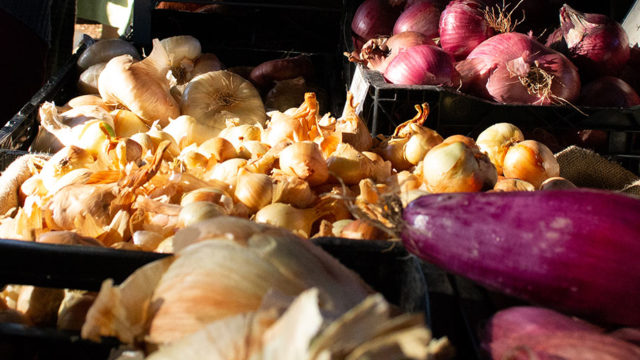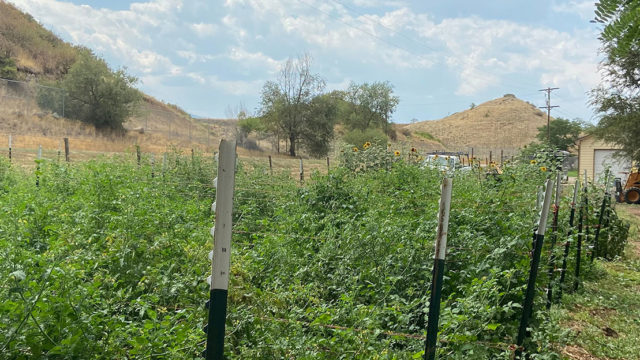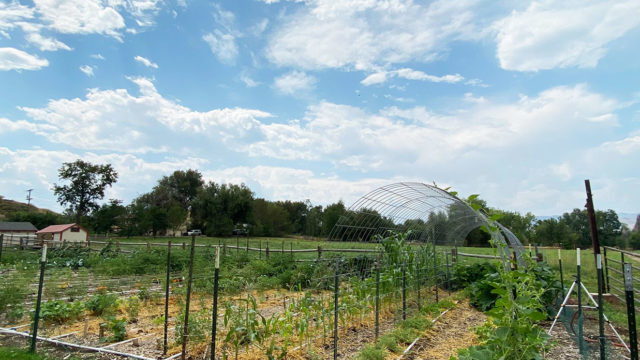As public venues pivoted to online models this year, and in-person farmers markets also paused (increasing their commission to cover the overhead of going online), local farms have begun developing direct-to-consumer offerings.
When Covid-19 struck, local farms — including Esoterra Culinary Garden and Speedwell — spun up community supported agriculture programs to survive the disruption to their typical distribution channels. (Read our story on those CSAs here).
Other farms decided to shift their business models more deeply with a consumer-direct approach. Browns’ Farm in Niwot is one example — it evolved a Covid-19-inspired CSA into a continued multifaceted local farm product partnership.
With the markets paused, Browns’ Farm had nowhere to sell its pounds of spinach, so Catherine connected with a pandemic-inspired movement on Facebook, Singin Seeds, that sold local farm products at open space trailheads. The group added the farm’s greens to its roster and before they knew it, Browns’ Farm had sold 80 pounds — 100 bags — of spinach.
Through the project, the farmers involved reached hundreds of customers and thousands of dollars worth of sales, but as stores reopened and peoples’ fears subsided, so did Singin’ Seeds sales.
Building a multivariate farm experience
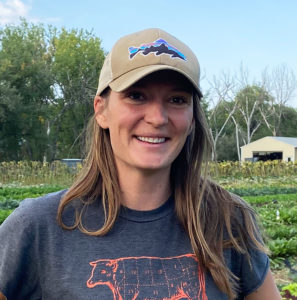
Inspired by the idea and her own quasi-apocalyptic thoughts about what she would want to have available in future crises, Browns’ Farm manager Catherine Blackwell helped the farm launch its own CSA and partnered with some of the other local producers featured in Singin Seeds.
Catherine visualized what she would want to bring, if, let’s say, the world had ended and she had to build an arc. “I know personally I would want coffee, mushrooms, bread,” Catherine told BLDRfly.
“It gave us a taste of where things might head inevitably,” says Catherine, “and how to get through the pandemic or the next outbreak; looking at what resources we have here.”
She pieced together a roster that made the most sense to offer alongside the Browns’ Farm CSA, including Bluebird Sky Farmstead’s eggs, Freshly Milled Flours, Peak State Coffee and Kingdom Come Mushrooms — all of which she tells BLDRfly had great, integral products but no market to sell in at the time.
Each of these producers has a presence at the pop-up market Browns’ Farm hosts on its CSA payment days (last and final one, October 5!), and its own CSA box of rotational veggies, Browns’ Farm offers on a sliding scale between $20 to $30 a week or between $400 to $600 for the whole season. Even though its CSA sold out for the year, with one month of the season remaining, people can still drop by on October 5 to snag goods from any of the other companies.
The farm plans on continuing to feature other local producers, and likely have their goods to offer for pick-up each week next year (or with flour, once a month.)
Freshly Milled
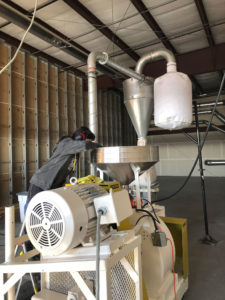
Catherine met Freshly Milled Flour founder Michele Moffat, a former Wall Street investment banker and NYC lawyer, when Michele bought a farm around the corner from Browns’ Farm, on Nimbus Road and 75th Street.
Michele discovered the importance of flour health when she moved west and began attending chapters of Mad Ag — a local non-profit, working hands-on with farmers and ranchers to implement healthier, regenerative agriculture practices.
As she learned how negatively these highly processed, industrialized flours impact our environment and our own health, Michele decided to invest in a mill as a resource to local growers so that they’d have a way to process their grains.
“She needed help tilling the ground so she could do trial plantings,” Catherine writes,” and voila! Here we are.”
[Developing a local food ecosystem in Boulder]
Bluebird Sky Farmstead
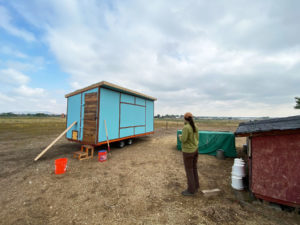
Raising pigs and chickens on a nearly-30-acre plot of land in west Longmont, Bluebird Sky Farmstead sells eggs right from its front door and its farmers grow a private half-acre vegetable garden for themselves and friends.
Daniel Dunlap and Annaliese Danckers, who own the farmstead, believe in livestock as the best way to regenerate the land, rotating it and building up the microbiology of the soil. Bluebird Sky Farmstead also got involved early on with Singin’ Seeds when Ben reached out during the Covid freeze, having heard that Bluebird Sky had a ton of eggs with no market.
“Bluebird Sky is near and dear to our hearts,” Catherine tells BLDRfly. “We have been in many Young Farmer meetings together and have all worked on various farms in Boulder County. We all set out on our own around the same time which instilled a sense of comradery.”
[How a new Boulder County law could jumpstart a local livestock economy]
Peak State Coffee
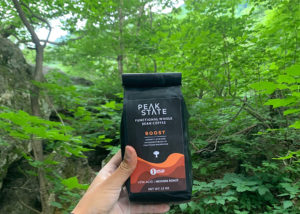
When Danny Walsh signed up for the Browns’ Farm CSA, Catherine noticed his email signature as the founder of Peak State Coffee, a local roaster of whole-bean coffee infused with functional mushrooms. She inquired about his product and whether it would help him to offer it to Browns’ CSA.
Having just launched his coffee product with a partner roaster in January, and with all the grocery stores having far more on their mind than talking to a new coffee roaster, he happily agreed.
“Any buyers in stores were trying frantically to keep soup and frozen pizza on the shelves,” Danny recounts, “not bring on a new product.”
[Boulder’s Peak State Coffee brings ‘shroom-infused coffee]
Kingdom Come Farm
Growing majestic mushrooms 50 minutes east of Boulder in Weld County’s Fort Lupton, Kingdom Come Farm launched in 2018 when founder Tom Bailey moved from Golden to a 86-acre ranch with his mother, who breeds dogs and keeps horses and sheep. Catherine connected to Tom through Instagram after seeing his beautiful mushroom blooms.

The move and all the space inspired Tom, who had just graduated in 2017 with a degree in accounting and finance, to look into farming. Initially he considered vegetable crops, but when family friend Clint Buckner of Longmont’s Buckner Family Farm, which raises and sells meat to many high-end Boulder restaurants, suggested Tom find something more niche since most chefs already have a trusted small-scale veggie farmer, Tom shifted focus to mushrooms.
Tom built a 2,880 square-foot building for his mushroom operation, all indoors, and currently grows five varieties of mushrooms including Blue Oyster, Chestnuts, Lion’s Mane, King Trumpets, and Maitake. The building can accommodate a capacity of 400 to 500 pounds of mushrooms a week, but currently Tom grows and harvests around 150 pounds, selling out each week. His delivers them to high-end restaurants like Boulder’s Blackbelly and Pizzeria Locale, as well as others outside of Boulder, with chefs as his main clients.
He harvests his mushrooms from the block and gives them to the chef in full form, with no processing, breaking it up or packaging, and you don’t want to eat them raw. All of the ‘shrooms Tom grows need cooking or at least heat to become edible.

Header Image: Browns’ Farm’s farm stand at the edge of its property. Image: Tatyana Sharpton.


